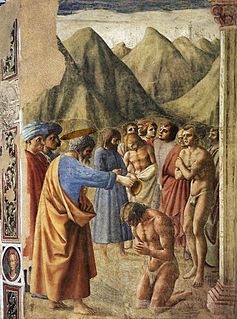
Baptists are Christians distinguished by baptizing professing believers only, and doing so by complete immersion. Baptist churches also generally subscribe to the tenets of soul competency/liberty, salvation through faith alone, scripture alone as the rule of faith and practice, and the autonomy of the local congregation. Baptists generally recognize two ordinances: baptism and the Lord's supper.

Baptism is a Christian rite of admission and adoption, almost invariably with the use of water, into Christianity. The synoptic gospels recount that John the Baptist baptised Jesus. Baptism is considered a sacrament in most churches, and as an ordinance in others. Baptism is also called christening, although some reserve the word "christening" for the baptism of infants. It has also given its name to the Baptist churches and denominations.
Born again, or to experience the new birth, is a phrase, particularly in evangelicalism, that refers to "spiritual rebirth", or a regeneration of the human spirit from the Holy Spirit, contrasted with physical birth.

Calvinism is a major branch of Protestantism that follows the theological tradition and forms of Christian practice set down by John Calvin and other Reformation-era theologians.

Infant baptism is the practice of baptising infants or young children. In theological discussions, the practice is sometimes referred to as paedobaptism, or pedobaptism, from the Greek pais meaning "child". This can be contrasted with what is called "believer's baptism", or credobaptism, from the Latin word credo meaning "I believe", which is the religious practice of baptising only individuals who personally confess faith in Jesus, therefore excluding underage children. Opposition to infant baptism is termed catabaptism. Infant baptism is also called "christening" by some faith traditions.
The five solae of the Protestant Reformation are a foundational set of principles held by theologians and clergy to be central to the doctrine of salvation as taught by the Lutheran and Reformed branches of Protestantism. Each sola represents a key belief in the Lutheran and Reformed traditions in contradistinction to the teaching of the Roman Catholic Church. These Reformers claimed that the Catholic Church, especially its head, the Pope, had usurped divine attributes or qualities for the Church and its hierarchy.

The Westminster Shorter Catechism is a catechism written in 1646 and 1647 by the Westminster Assembly, a synod of English and Scottish theologians and laymen intended to bring the Church of England into greater conformity with the Church of Scotland. The assembly also produced the Westminster Confession of Faith and the Westminster Larger Catechism. A version without Scripture citations was completed on 25 November 1647 and presented to the Long Parliament, and Scripture citations were added on 14 April 1649.

A godparent, in many denominations of Christianity, is someone who bears witness to a child's baptism and then aids in their catechesis, as well as their lifelong spiritual formation. In the past, in some countries, the role carried some legal obligations as well as religious responsibilities of the Godparent. In both religious and civil views, a godparent tends to be an individual chosen by the parents to take an interest in the child's upbringing and personal development, to offer mentorship or claim legal guardianship of the child should anything happen to the parents.

Theology of Anabaptism is not existent in the traditional sense of the word regarding to the Amish according to John S. Oyer, who argues in that direction in his article "Is there an Amish Theology". Oyer states that the Amish have an implicit theology that can be found in their biblical hermeneutics, but no explicit, formal and systematic theology. The Amish are not interested in the classical subjects of systematic theology, according to Oyer. It is easier to find out about their implicit theology in talking with them than reading written documents. According to Oyer, their implicit theology is practical, not theoretical. The most important written source of Amish theology, according to Oyer, is "1001 Questions and Answers on the Christian Life". Other important written sources for Anabaptist theology are the Schleitheim and Dordrecht Confessions of Faith

Covenant theology is a conceptual overview and interpretive framework for understanding the overall structure of the Bible. It uses the theological concept of a covenant as an organizing principle for Christian theology. The standard form of covenant theology views the history of God's dealings with mankind, from Creation to Fall to Redemption to Consummation, under the framework of three overarching theological covenants: those of redemption, of works, and of grace.
The means of grace in Christian theology are those things through which God gives grace. Just what this grace entails is interpreted in various ways: generally speaking, some see it as God blessing humankind so as to sustain and empower the Christian life; others see it as forgiveness, life, and salvation.

Catechesis is basic Christian religious education of children and adults. It started as education of converts to Christianity, but as the religion became institutionalized, catechesis was used for education of members who had been baptized as infants. As defined in the Catechism of the Catholic Church, paragraph 5 :
Catechesis is an education in the faith of children, young people and adults which includes especially the teaching of Christian doctrine imparted, generally speaking, in an organic and systematic way, with a view to initiating the hearers into the fullness of Christian life.
Regeneration, while sometimes perceived to be a step in the Ordo salutis, is generally understood in Christian theology to be the objective work of God in a believer's life. Spiritually, it means that God brings Christians to new life or "born again" from a previous state of separation from God and subjection to the decay of death. Thus, in Lutheran and Roman Catholic theology, it generally means that which takes place during baptism. In Calvinism and Arminian theology, baptism is recognized as an outward sign of an inward reality which is to follow regeneration as a sign of obedience to the New Testament.
Baptismal regeneration is the name given to doctrines held by major Christian denominations which maintain that salvation is intimately linked to the act of baptism, and that salvation is impossible apart from it. Etymologically, the term means "being born again" "through baptism" (baptismal). Etymology concerns the origins and root meanings of words, but these "continually change their meaning, … sometimes moving out of any recognisable contact with their origin … It is nowadays generally agreed that current usage determines meaning." While for Reformed theologian Louis Berkhof, "regeneration" and "new birth" are synonymous, Herbert Lockyer treats the two terms as different in meaning in one publication, but in another states that baptism signifies regeneration.

The theology of Huldrych Zwingli was based on the Bible, taking scripture as the inspired word of God and placing its authority higher than what he saw as human sources such as the ecumenical councils and the church fathers. He also recognised the human element within the inspiration noting the differences in the canonical gospels. Zwinglianism is the Reformed confession based on the Second Helvetic Confession promulgated by Zwingli's successor Heinrich Bullinger in the 1560s.

Believer's baptism is the Christian practice of baptism as this is understood by many evangelical denominations, particularly those that descend from the Anabaptist and English Baptist tradition. According to their understanding, a person is baptized on the basis of his or her profession of faith in Jesus Christ and as admission into a local community of faith.

Walter Scott was one of the four key early leaders in the Restoration Movement, along with Barton W. Stone, Thomas Campbell and Thomas' son Alexander Campbell. He was a successful evangelist and helped to stabilize the Campbell movement as it was separating from the Baptists.

John the Baptist, who is considered a forerunner to Christianity, used baptism as the central sacrament of his messianic movement. Christians consider Jesus to have instituted the sacrament of baptism. The earliest Christian baptisms were probably normally by immersion, though other modes may have also been used. By the third and fourth centuries, baptism involved catechetical instruction as well as chrismation, exorcisms, laying on of hands, and recitation of a creed. In the West, Affusion became the normal mode of baptism between the twelfth and fourteenth centuries, though immersion was still practiced into the sixteenth. In the sixteenth century, Martin Luther retained baptism as a sacrament, but Swiss reformer Huldrych Zwingli considered baptism and the Lord's supper to be symbolic. Anabaptists denied the validity of infant baptism, which was the normal practice when their movement started and practiced believer's baptism instead. Several groups related to Anabaptism, notably the Baptists and Dunkards, soon practiced baptism by immersion as following the Biblical example.

A sacrament is a Christian rite recognized as of particular importance and significance. There are various views on the existence and meaning of such rites. Many Christians consider the sacraments to be a visible symbol of the reality of God, as well as a means by which God enacts his grace. Many denominations, including the Catholic, Anglican, Lutheran, Methodist, and Reformed, hold to the definition of sacrament formulated by Augustine of Hippo: an outward sign of an inward grace that has been instituted by Jesus Christ. Sacraments signify God's grace in a way that is outwardly observable to the participant.

In Reformed theology, baptism is a sacrament signifying the baptized person's union with Christ, or becoming part of Christ and being treated as if they had done everything Christ had. Sacraments, along with preaching of God's word, are means of grace through which God offers Christ to people. Sacraments are believed to have their effect through the Holy Spirit, but these effects are only believed to be beneficial to those who have faith in Christ.















